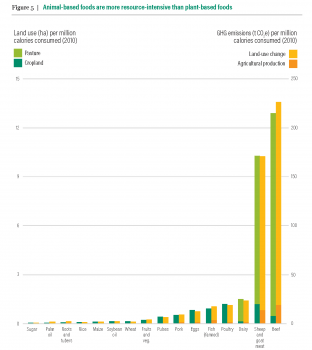Linus Blomqvist in The Breakthrough:
 For decades, environmentalists have been rightly concerned about the environmental impact of humanity’s food systems. Often, this has meant advocating for shifting diets — in particular, away from meat, given its outsized environmental impact.
For decades, environmentalists have been rightly concerned about the environmental impact of humanity’s food systems. Often, this has meant advocating for shifting diets — in particular, away from meat, given its outsized environmental impact.
A recent, much-publicized example is the EAT-Lancet Commission’s new report, whose flexitarian dietary guidelines include some, but not much, meat. But what’s often been missed in the discussion of these guidelines is that in terms of environmental impacts, how much meat you eat might matter less than what kind of meat you eat. What if shifting from one type of meat (beef) to another (monogastrics, like pork and poultry) offered environmental benefits at least as large as simply reducing meat consumption across the board?
As this figure shows, beef is simply much, much worse for the environment than all other forms of food, due mainly to enteric methane and the large amount of land required to feed cattle. The most meaningful distinction isn’t animal vs. plant — it’s beef (and other ruminants like sheep and goat) vs. everything else.
More here.
